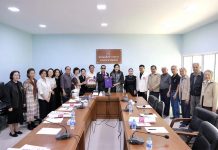SEOUL, Oct. 17 South Korea is not likely to be affected by the U.S. exit from quantitative easing (QE) as Asia’s fourth-largest economy has relatively strong economic fundamentals, a former International Monetary Fund (IMF) official said Friday.
“It is very quite remarkable, in my point of view, that in the last two years, Korea has not faced a significant impact of the troubled QE operation,” former IMF director of the Asia & Pacific Department Anoop Singh said at a Seoul forum.
“Capital flows to Korean bonds have demonstrated a safe-haven behavior.”
The U.S. Fed is expected to announce an end to its bond-purchasing program when it meets later this month, raising the specter of a follow-up with a rate hike. South Korea’s financial authorities are worried that such development would lead to a capital flight, destabilizing the local autonomy still on shaky grounds.
Singh noted that if the U.S. Federal Reserve takes a natural and proper QE exit based on a growth recovery of the U.S. economy, it will not hurt investor confidence and will be unlikely to cause capital outflows for South Korea.
“It could even cause inflows to Korean equity and bank debt through positive signaling,” he said.
“South Korea is not an emerging market,” said the Indian-born expert, adding that South Korea has strong fundamentals to overcome the external impacts stemming from the United States compared with other emerging economies like India, Thailand and Indonesia, which have suffered notable economic slowdowns in recent years.
“Korean bonds have appreciated significantly. But their productivity has remained strong despite the significant appreciation.”
He advised South Korea to focus more on undergoing economic restructuring to enhance productivity and upgrade the economy at large.
“I think it needs action soon, but the effects will come years later,” he said. “Key structure reforms take time because different dimensions of easing must move back to the talks of productivity and structure reforms that we needed.”




